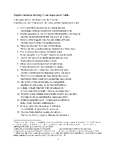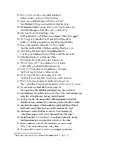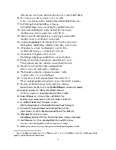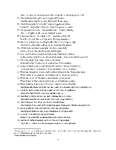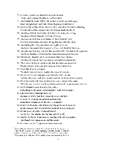Discourses of Muslim Scholars in Colonial Ghana
by John Hanson and Muhammad al-Munir Gibrill
Labbo (elegiac poem)
Creator: al-ḥājj 'Umar ibn Abī Bakri of Kete-Krachi
Description: This elegiac poem is composed by al-ḥājj 'Umar Krachi (al-ḥājj 'Umar ibn Abī Bakr) on the death of his son, Lobbo.
Al-ḥājj 'Umar Krachi had numerous children, but he was particularly close to Labbo, whom he hoped would succeed him as a Muslim scholar. Labbo was one of the few family members accompanying al-ḥājj 'Umar on his pilgrimage to the Holy Lands. Labbo was 32 years old when he died in 1933 or 34. The cause of death is uncertain: the poem refers to an illness that affected Labbo's internal organs and referred to it as fukā or asthma. From the description, however, the illness probably was more serious.
The poem was written in the rithā' or elegiac genre and follows the classical conventional structure. It begins by pretending that the deceased has departed without any obvious discord between them, although news of his departure has become widely advertised. Then the poem returns to reality and describes the impact of the death upon the community, who cannot be consoled as they revealed their inner pain through groans and uncontrollable tears. The poem then describes the funeral rites and procession to and from the tomb, including the expressions of grief through lamentations. The poem turns to the outstanding moral virtues and achievements of the deceased. It asserts that Labbo had obtained virtually everything one could have hoped for in the world, thereby earning God's favor and grace. The poem notes the various prayers made at the deceased's grave, which was perfumed with aromatic plants and flowers: the supplicants asked God to accept Labbo in His blessed abode.
Al-ḥājj 'Umar Krachi received, as local custom demanded, messages of condolences from near and far, including northern Nigeria. The poem mentions some of these messages and adds that financial donations accompanied the messages, also as was customary. The poem ends with conventional prayers and some of al-ḥājj 'Umar's philosophical thoughts about life and how it is not worth living anymore, with weakness and corruption have eaten into the foundation of social nobility.
Al-ḥājj 'Umar Krachi had numerous children, but he was particularly close to Labbo, whom he hoped would succeed him as a Muslim scholar. Labbo was one of the few family members accompanying al-ḥājj 'Umar on his pilgrimage to the Holy Lands. Labbo was 32 years old when he died in 1933 or 34. The cause of death is uncertain: the poem refers to an illness that affected Labbo's internal organs and referred to it as fukā or asthma. From the description, however, the illness probably was more serious.
The poem was written in the rithā' or elegiac genre and follows the classical conventional structure. It begins by pretending that the deceased has departed without any obvious discord between them, although news of his departure has become widely advertised. Then the poem returns to reality and describes the impact of the death upon the community, who cannot be consoled as they revealed their inner pain through groans and uncontrollable tears. The poem then describes the funeral rites and procession to and from the tomb, including the expressions of grief through lamentations. The poem turns to the outstanding moral virtues and achievements of the deceased. It asserts that Labbo had obtained virtually everything one could have hoped for in the world, thereby earning God's favor and grace. The poem notes the various prayers made at the deceased's grave, which was perfumed with aromatic plants and flowers: the supplicants asked God to accept Labbo in His blessed abode.
Al-ḥājj 'Umar Krachi received, as local custom demanded, messages of condolences from near and far, including northern Nigeria. The poem mentions some of these messages and adds that financial donations accompanied the messages, also as was customary. The poem ends with conventional prayers and some of al-ḥājj 'Umar's philosophical thoughts about life and how it is not worth living anymore, with weakness and corruption have eaten into the foundation of social nobility.
Date: 1931
Date Range: 1930-1939
Location: Kete-Krachi , Volta Region, Ghana
Format: Text/pdf
Language: English
Rights Management: Educational use only, no other permissions.
Contributing Institution: Muhammad al-Munir Gibrill; John H. Hanson; Institute of African Studies, University of Ghana at Legon; Northwestern University; MATRIX: The Center for Humane Arts, Letters & Social Sciences Online at Michigan State University
Contributor: Muhammad al-Munir Gibrill (translator and transcriber); John H. Hanson (reviewer)
Digitizer: MATRIX
Archive: University of Ghana at Legon, Institute of African Studies
Source:
University of Ghana at Legon, Institute of African Studies, Arabic collection, document number 16 (v). The collection holds other copies: document numbers 109(vi), 138, and 239 (iv).
